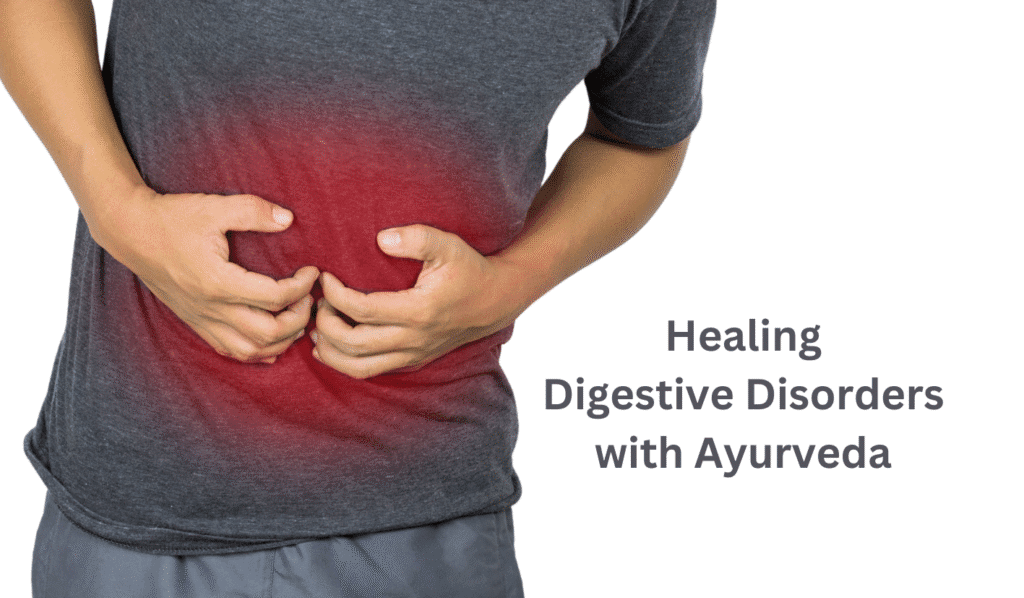Digestive health is at the core of overall well-being in Ayurveda. Ayurveda offers a holistic approach to treating digestive disorders, addressing not just the symptoms but the root causes. Through a combination of personalized treatments like Panchakarma, dietary adjustments, and supportive practices such as Yoga and meditation, Ayurveda provides a comprehensive pathway to healing. This blog explores how these therapies, rooted in ancient wisdom, can effectively treat and manage various digestive disorders.
Understanding Digestive Disorders in Ayurveda
In Ayurveda, the digestive system is governed by the Agni, or digestive fire, which is responsible for the breakdown and assimilation of food. When Agni is balanced, digestion is smooth and effective, leading to good health. However, when Agni is weak or imbalanced due to factors like poor diet, stress, or environmental influences, it can lead to a range of digestive disorders. These disorders are often classified based on the imbalance of the three doshas: Vata, Pitta, and Kapha.
- Vata-Type Digestive Disorders: Characterized by bloating, gas, constipation, and irregular bowel movements, these disorders are caused by an excess of Vata dosha, which leads to dryness and irregularity in the digestive tract.
- Pitta-Type Digestive Disorders: These include conditions like acid reflux, heartburn, gastritis, and ulcers, caused by an excess of Pitta dosha, leading to excessive heat and inflammation in the digestive system.
- Kapha-Type Digestive Disorders: Disorders like sluggish digestion, heaviness, and excessive mucus are linked to an imbalance in Kapha dosha, leading to a slow and congested digestive process.
Panchakarma: The Ayurvedic Detoxification Process
Panchakarma is a cornerstone of Ayurvedic treatment, particularly for chronic and stubborn digestive disorders. It is a five-step detoxification process designed to cleanse the body of toxins (ama) and restore doshic balance. At the best Panchakarma center, this treatment is customized to the individual’s doshic imbalance and specific health needs.
- Vamana (Therapeutic Vomiting): Used primarily for Kapha-type disorders, this treatment involves the ingestion of emetic substances to induce vomiting, clearing mucus and toxins from the stomach and respiratory tract.
- Virechana (Purgation Therapy): This treatment is used for Pitta-type disorders and involves the use of herbal laxatives to cleanse the bowels, removing toxins from the liver and gastrointestinal tract.
- Basti (Enema Therapy): Basti is particularly effective for Vata-type disorders, where medicated oils or decoctions are introduced into the colon to clear accumulated waste and restore proper elimination.
- Nasya (Nasal Administration): This therapy involves the administration of herbal oils through the nostrils, cleansing the sinuses and balancing the doshas in the head and neck region, which can indirectly support digestive health.
- Raktamokshana (Bloodletting Therapy): Although not commonly practiced, this treatment is used for conditions involving toxins in the blood, which can affect the digestive system.
At the best Ayurveda center, Panchakarma is not just a treatment but a rejuvenation process that purifies the body and mind, enabling a fresh start for the digestive system.
Herbal Remedies and Dietary Adjustments
Ayurvedic treatment for digestive disorders also includes a wide range of herbal remedies and dietary recommendations tailored to the individual’s doshic constitution.
- Triphala: A combination of three fruits (Amalaki, Bibhitaki, and Haritaki), Triphala is a powerful digestive tonic that balances all three doshas and promotes regular bowel movements.
- Ginger: Known for its warming properties, ginger stimulates Agni and is particularly beneficial for Vata and Kapha digestive disorders.
- Aloe Vera: Cooling and soothing, Aloe Vera is excellent for Pitta-type disorders, helping to reduce inflammation and acidity.
- Cumin, Coriander, and Fennel: These spices are often recommended to enhance digestion, reduce gas and bloating, and support overall digestive health.
Dietary adjustments are also crucial in Ayurvedic treatment. Individuals are encouraged to eat according to their dosha, focusing on foods that balance their particular constitution. For example, those with Vata imbalances are advised to consume warm, moist, and grounding foods, while those with Pitta imbalances benefit from cooling, non-spicy foods.
The Role of Yoga and Meditation in Digestive Health
While Ayurveda provides the foundation for healing digestive disorders, the integration of Yoga and meditation can enhance the therapeutic effects. Yoga postures (asanas) and breathing exercises (pranayama) support the digestive process by stimulating Agni and promoting relaxation.
- Yoga Asanas: Poses like Pawanmuktasana (Wind-Relieving Pose), Ardha Matsyendrasana (Half Spinal Twist), and Paschimottanasana (Seated Forward Bend) are particularly beneficial for improving digestion and alleviating symptoms like gas, bloating, and constipation.
- Pranayama: Breathing exercises like Nadi Shodhana (Alternate Nostril Breathing) and Kapalbhati (Skull-Shining Breath) help balance the doshas, reduce stress, and enhance the functioning of the digestive system.
- Meditation: Regular meditation helps calm the mind and reduce stress, which is a significant factor in digestive disorders. Practices like Mindfulness Meditation and Loving-Kindness Meditation can be particularly effective.
Stress Management and Digestive Health
Stress is a major contributor to digestive disorders, disrupting Agni and leading to imbalances in the doshas. Ayurveda emphasizes the importance of managing stress through a combination of lifestyle adjustments, herbal remedies, and supportive practices like Yoga and meditation.
- Ashwagandha: This adaptogenic herb is known for its ability to reduce stress and anxiety, promoting a calm and balanced state of mind.
- Brahmi: Another powerful herb, Brahmi, is used to enhance mental clarity, reduce stress, and support cognitive function, indirectly benefiting digestive health.
- Regular Routine: Ayurveda advocates for a regular daily routine (Dinacharya) to maintain balance in the body and mind. This includes waking up early, eating meals at consistent times, and practicing Yoga and meditation regularly.
Choosing the Best Ayurveda Treatment for Digestive Disorders
When selecting the best Ayurveda treatment for digestive disorders, it is crucial to choose an authentic Ayurveda center that offers personalized care. The best Ayurveda center will assess your unique constitution, lifestyle, and health history to design a treatment plan that addresses the root cause of your digestive issues.
The treatment approach may include:
- Personalized Panchakarma therapy: Customized to cleanse and rejuvenate your digestive system.
- Herbal remedies: Tailored to your dosha and specific digestive disorder.
- Dietary guidelines: Based on your constitution and digestive needs.
- Yoga and meditation practices: To support digestion and reduce stress.
Conclusion: Embracing Holistic Healing
Digestive health is essential for overall well-being, and Ayurveda offers a comprehensive approach to healing that goes beyond symptom management. By addressing the root causes of digestive disorders through Panchakarma, herbal remedies, and supportive practices like Yoga and meditation, Ayurveda provides a path to lasting health and vitality.
At Shantitheeram Ayurveda – Lakeside Heritage Resort, we offer the best Panchakarma center and authentic Ayurveda Kerala treatments to help you achieve optimal digestive health. Our experienced practitioners are dedicated to providing personalized care that harnesses the wisdom of Ayurveda and the healing power of nature. Whether you are dealing with chronic digestive issues or seeking to enhance your overall well-being, we invite you to experience the transformative benefits of Ayurvedic healing.

